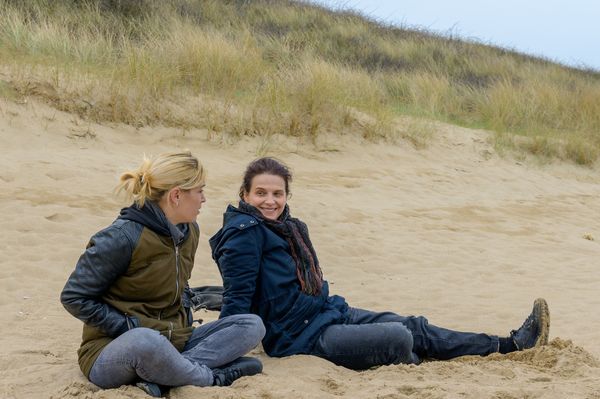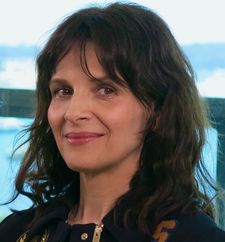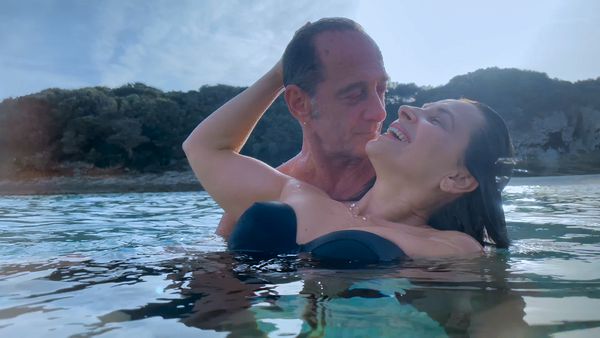 |
| Juliette Binoche and Hélène Lambert in Between Two Worlds Photo: UniFrance |
“I was very vulnerable, I accepted I was raw, and I could not hide anything,” she says. “I was in physical and mental tune with what I had to experience in the film. And the women, all non-actors who had to play alongside me, sensed it right away. When my Polish grandmother came to France during the Second World War she had to do odd jobs like housecleaning in order to survive. When my mother was a student she also did some occasional jobs. And it was the same for me when I was a student. So in a way it was part of my family history for a long time - and it’s still part of me. It’s about being resourceful and getting by.”
Binoche, who turned 58, in March, transformed her fragile state to advantage. “The first night of the shoot we all had dinner together - because they were waiting for this actress to arrive on set. As soon as they saw me exhausted and willing to talk about whatever subject they wanted, they were very welcoming and fun to be with. I think that when you are there and not trying to prove anything, being patient and listening to what is coming out, relationships are quite easy.
"I was coming to them in their world and I was eager to know what was going on in their lives. So the interest I had validated my presence. And being seen and heard makes a huge difference to people’s lives. Not seeing them would have been a condemnation of their humanity. The more you include people and just being there with them you humanise people. I was in a place in my life where I was at the bottom and I used that place in my life in order to embody this film.”
 |
| Juliette Binoche: 'The humiliation I felt was a key point in getting to the heart of the film. I found a parallel in my own life' Photo: Richard Mowe |
Binoche originally had the book brought to her by director Cédric Kahn but Aubenas did not want to relinquish the rights for an adaptation. Sticking to her guns the actress who gleefully admits she can be rather stubborn, tried again. “So I asked Florence again, and she told me that the only way she would accept was on the condition that Emmanuel Carrère write the screenplay. But Emmanuel was not available at the time; he was working on his novel, The Kingdom. To sweeten the deal, I suggested that Emmanuel not only write the adaptation but direct the film. After several dinners with Emmanuel and Florence, she finally agreed.
“I met a producer who, by chance, was also working on an adaptation of The Night Cleaner. The project was starting to take shape but I didn’t want just to act in the film, I wanted to produce it, which for various reasons was refused to me. I experienced this rejection as unfair and humiliating. That being said, since the central theme of Between Two Worlds is the humiliation of women, in the end, it served me well. The humiliation I felt was a key point in getting to the heart of the film. I found a parallel in my own life. I had a short time to get there. I’ve been an actress for more than 40 years and as you get older you know about life and you find short cuts.”
As soon as filming started Aubenas disappeared from view. “I never really talked about the role with Florence. In the book she describes in detail what is going on. I understand that some of the women were hurt by the exposé and felt betrayed. I can understand that because it is pushing a button in a place that is fragile. Others saw the positive side and thought it was great that someone was prepared to talk about them and it could change their world. Nobody had heard them. It went both ways. I was on a mission of truth and I need to give that truth back to people’s consciousness. I did not have any conflict about doing it. I wanted to get as close as I could to their situation.”
 |
| Vincent Lindon and Juliette Binoche under Claire Denis’s direction in Both Sides of the Blade (aka Fire) Photo: Courtesy of Curiosa Films. An IFC Films release. |
As an actress she is used to doing unconventional homework. She recalls an early experience working with an ex-partner director Leos Carax for The Lovers On The Bridge (Les Amants du Pont Neuf). “And I know that the film talks how much of a disguise you can adopt to go into a world you do not know. I have experienced that as an actor by going in to the streets when I was playing in Lovers On The Bridge at the very start of my career. I have never felt I was lying rather I felt that I really had to feel and understand the experience in order to have the authorisation to talk about it. It was just more about being humble and descending from my so-called life of an actress in to a world I had to experience. What I mean by descending is being humble enough to go there and then to give it back in the form of the film which is not reality - it is a transition into another world in which you have to find the quintessentials of what it is.”
Binoche would have liked to have stood in solidarity with the women when Between Two Worlds opened the Directors’ Fortnight at last year’s Cannes Film Festival in July. She had to settle with being zoomed in from the States where she was involved with two productions. One was a film in Mississippi called Paradise Highway in which she plays a truck driver forced to smuggle an illicit cargo. Morgan Freeman plays an FBI operative hot on her tail. “And that was rough shoot. I was stuck in a truck in a fierce heat and the vehicle had no air conditioning. I was working day and night. Talk about exhaustion - that’s an understatement … and there were lots of mosquitoes. An upside was I was playing with a girl of 12, Hala Finley (We Can Be Heroes), an amazing actress and that was exciting.”
She travelled on to Georgia in Atlanta to join Colin Firth and Toni Collette in Staircase, an HBO mini-series, directed by Antonio Campos about a novelist accused of murdering his spouse who dies after falling down steps the couple’s home - which screened on Sky TV and Now in the UK. Police suspected he had bludgeoned her to death and staged the scene to seem like an accident.
Before that Binoche had been reunited for the third time with director Claire Denis and played opposite Vincent Lindon for the first time in Both Sides Of The Blade (Avec amour et acharnement) which premiered at the Berlin Film Festival. She plays Sara, an accomplished radio journalist whose life with retired rugby player Jean (Lindon) is complete. Then François, (Grégoire Colin from Denis’ Beau Travail) Sara’s former lover, reappears and threatens the marriage.
The film was both developed and shot during different stages of lockdown in France, but Denis said the unusual process actually helped to bring her and her cast closer together, making them a filmmaking family. Binoche says: “I think we were quite brave to make this film. It’s very tricky film and it wasn’t simple for any of us. It transformed us, shook us, we didn’t remain the same. The result is the film you see.” It is scheduled for US release in July under the title Fire through IFC and for a UK release in September.
Between Two Worlds is on release through Curzon in the UK from 27 May and in the US through Cohen Media Group, date tbc. Richard Mowe talked to Juliette Binoche at the Rendezvous with French Cinema in Paris in January.





















